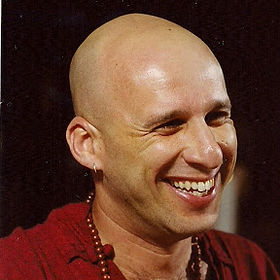


Separated from the main city by dirt roads and occasional squares of green rice fields, the Gompa of Kopan stands high, fortress like
above the local landscape. A tannacked road leads up to the main gate and then, once inside the monastery walls, the valley spreads itself to the eye and the quiet, even at high noon, is remarkable. Rubbing shoulders with the grazing oxen and cows and the closer sky, it is not unusual to find foreigners who are drawn to Buddhism spending time in Kopan monastery, meditating and discoursing with the high monks. And it was really not unusual to discover Israeli stage and film actor and aspiring Zen Buddhist, Gil Alon there.
Dressed casually with shaven head, with broad shoulders and with an even broader smile, it was obvious that self imposed exile within the cloistered monastery walls was treating Gil kindly.
"This place is another dimension," he said "when you read
what's in the papers, like the killings and the violence, you think it's crazy and terrible but it's good to isolate yourself once in a while."
"Buddhism is a big trend, because it does not preach," he said as he explained how he came into contact with the faith in a land where two major religions live together in a politically charged atmosphere. "Israel (like most countries),
is made up of extremists, traditionalists
and modernists," he said but he emphasised that "We don't let extremists influence us," recalling how the Dalai Lama has twice visited Israel in an unofficial capacity.
A teacher in the Department of Zen & High Awareness at the MediCine College back in Tel Aviv and a student in a Zendo, he first started
working professionally as an actor at the age of 16 and at 20 came across a book of Zen stories and then a lifelong passion was born. "Till now I don't know why," he said and tells the story of an
Israeli who went to Korea and became a Zen monk after seven years under whom he studied at the Zen Buddhist department in Israel.
Currently on the last leg of a year long trip of discovery through the east, on a mission to absorb as much as he can, with visits to, among others, South Korea and India already under his belt, he talks about his other passion besides acting and Buddhism. To fuse both the passions together by holding drama workshops on Zen Buddhism and creation, as he has said, throughout his visit to the east, "to explore the connection between Buddhism and creativity."
The drama workshop, slated for the 11th at the Rastriya Nachghar under the title of 'I Don't Know', will be a session of improvisation based on the Zen concept of the 'here and now'. "To bring oneself out," he said "Zen talks about
the present moment. This is the present," he said, the shaded cement of the residential quarters cool to the touch and the main city far below, "The text that has been said is nothing and the text that will be said is nothing. And all we have is the present moment."
After a career already spanning 24
years and with the inevitable rise of fame, although he says that "being famous gives you the feeling that it is not
important", struggling and fighting for his artistic desire still remains a strong part of his makeup.
And back in Israel it seems there is no lack of resources and outlets for him to practice what he preaches. With a population of 6.2 million and
with 2000-3000 productions a year (1000 of them children's plays) it is number one in the world, he said, in terms of theatre productions compared to population size. "Fifteen years ago there were only
three to four playwrights. Now there is
an enormous amount" with the Jewish identity and the Israeli identity always coming into focus and always developing. "We are
questioning all the time. We don't take things for
granted," he said. Actors, or anyone, he advised should never
consider themselves as being good, the best, beautiful. "Be yourself and then be good. Put it out in an innocent
sincere way," he said. "The mission of an actor is to
discover his individuality. They bring out emotions which they show on
stage and then they keep it back. Real actors concentrate on art." But he added that everyone is a creator and that it is important to
"cultivate and discover creation in people."


